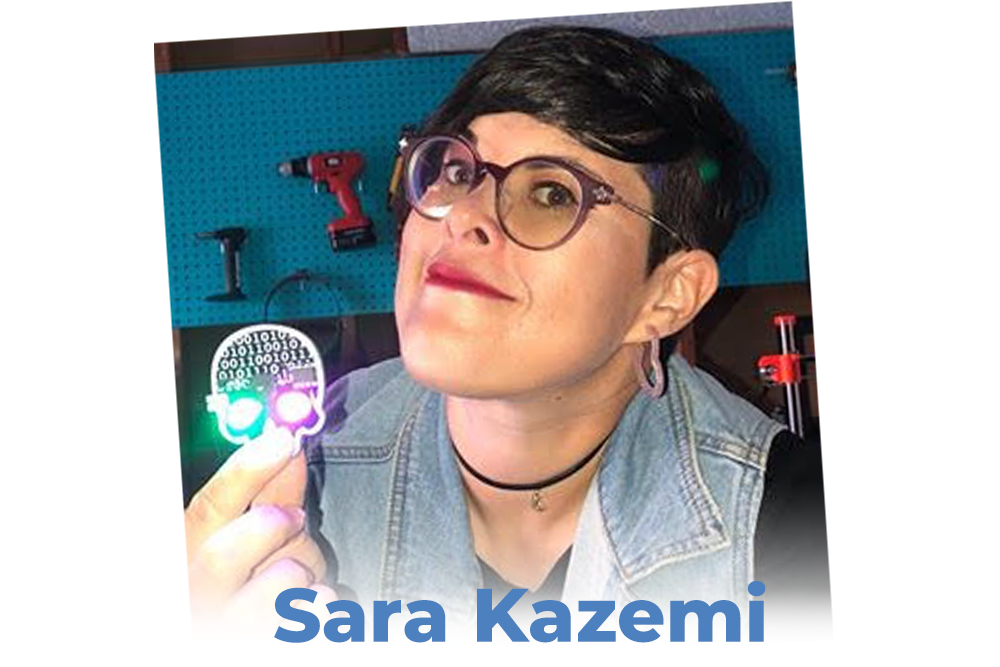
High School Advocate for Computer Science
The excitement in learning is critical for quickly adopting new skills. As impressive as our CMD+CTRL Cyber Ranges are for accomplishing this, a primary contributor to success is the ability for participants to quickly learn and “do something”. From the proctors to cheat sheets, our team provides everything needed for a quick ramp-up. However, it’s the willingness of participants to share, demonstrate and educate peers about their findings that provides such an immersive and indulgent learning environment.
Sara has spent years expanding local High School software education with initiatives that have increased female enrollment rates, expanded extracurricular activities and developed new computer science curriculums. We spent some time with Sara who shared her story and recommendations on how others can educate themselves and others in computer science and cybersecurity.
Q: Tell us about yourself and how you got involved in educating others about Computer Science and Cybersecurity?
Sara: I started out as a Computer Science major when I was 17 as a college freshman, but changed my major after taking an uninspiring beginner’s course that was filled with flowcharts and very little excitement. I lacked resources and resiliency, which is why I think it is so important to serve as a mentor to youths from under-represented backgrounds.
For the past four years, I’ve been a High School Computer Science teacher leveraging the programming skills I honed while working towards a Master’s degree in Computational Linguistics. Teaching CS to high schoolers made me realize I wanted to go back and learn about software engineering, so I took academic leave to do just that. While on leave, I periodically return to the high school to tutor students in AP Computer Science or to lead fun programming/Arduino workshops after school.
Q: How have you built up your Cybersecurity skills over the years?
Sara: Being on academic leave has allowed me the time to explore internships in the industry. This past summer, I completed an internship with Qualcomm in San Diego, CA. During the internship, I was able to participate in my first Security Innovation competition using the Gold Standard Cyber Range with senior engineers and managers!
Perhaps the most helpful skill I had going in was my knowledge of SQL, which allowed me to uncover SQL Injection vulnerabilities. Beyond that, I’ve always been quite good at social engineering since I started using the Internet as a curious teen in the 90s. In fact, I met one of my best friends in high school because he got blamed for one of my hacks — whoops!
Q: What resources would you recommend to others interested in growing their security skills?
Sara: The best way to pick up new skills is to learn from others who know things that you don’t! I learned a lot at my first SI Cyber Range competition at Qualcomm, which I was then able to apply in Hack Through the Holidays with InstaFriends. And of course, check out OWASP for a variety of tools, education, events, and meetups!
Q: There are a ton of places to learn from others – what do you attend or recommend?
Sara: I enjoy the inclusivity of the ACM Richard Tapia Celebration of Diversity in Computing Conference and hope to one day attend Grace Hopper and DEFCON. Groups I currently participate in include Women in Computing (WIC), NCWIT, and Women Who Code.
Q: What advice would you give to other professionals who want to help others build their skills?
Sara: Volunteer as a mentor at hackathons or, if participating in an event, group up with people with mixed skill levels so you can serve as a mentor to beginners. Make sure to understand that being a mentor doesn’t necessarily mean being the leader or boss.
I also volunteer to lead a workshop at a local high school, especially in areas with students from backgrounds that are typically underrepresented in tech. There are also organizations such as Microsoft Philanthropies’ TEALS, through which industry professionals can mentor high school computers, science students. Many of these events and organizations can be easily followed on Meetup and LinkedIn.
Our team and many others encourage people to follow Sara’s path and help expand computer science education to larger and younger groups of people.